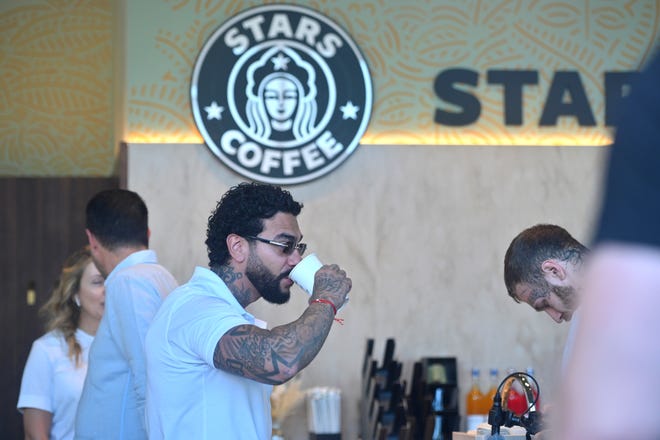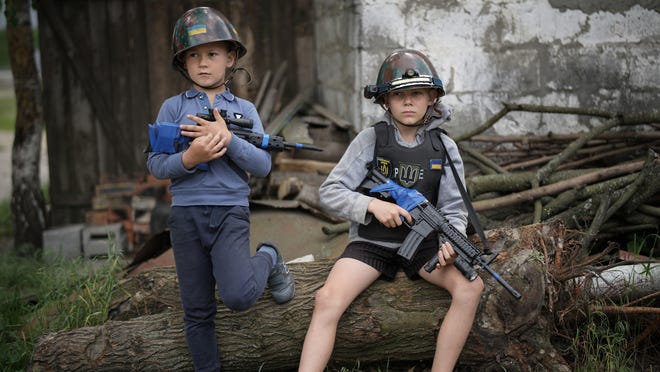No breakthroughs appear to have come out of Thursday’s meeting among Ukrainian President Volodymyr Zelenskyy, U.N. Secretary-General António Guterres and Turkish President Recep Tayyip Erdogan, as the conflict with Russia approaches the six-month mark with no end in sight.
There was some hope their summit in the western Ukraine city of Lviv would yield progress on issues related to the war, though not major steps that would lead to the conflict’s end. Even lesser agreements would require the assent of Vladimir Putin, who did not participate. Erdogan, who has tried to serve as a mediator in the dispute, said he will consult with the Russian president.
The three participants Thursday discussed expanding exchanges of prisoners of war and arranging for U.N. atomic energy experts to visit and help secure Europe’s biggest nuclear power plant in Zaporizhzhia, which is in the middle of fierce fighting that has raised fears of catastrophe.
“The area needs to be demilitarized, and we must tell it as it is: Any potential damage in Zaporizhzhia is suicide,” Guterres said.
Meanwhile, Russian missile strikes that began Wednesday night continued Thursday morning in and around the northeastern city of Kharkiv, killing at least 17 and wounding 42, Ukrainian authorities said. Zelenskyy called the assault “despicable and cynical.”
Latest developments:
►In the latest in a series of incidents on Russian soil near the border with Ukraine, an ammunition dump caught fire in the Belgorod region, the regional governor said. No casualties were reported.
►Amid the tense international climate created by the war, Russia deployed warplanes carrying state-of-the-art hypersonic missiles to its Kaliningrad region, which is surrounded by two NATO countries, Poland and Lithuania.
►Mariupol’s minister of education and four school principals are suspected of treason, the Prosecutor General’s Office of Ukraine said. They’re accused of cooperating with Russian occupation authorities in Mariupol and heading “a pseudo-organization that organizes the educational process in the city,” the office said.
►Russian and Ukrainian officials acknowledged Tuesday that an ammunition dump exploded in northern Crimea, the U.K. Ministry of Defense said. The Russian Defense Ministry blamed Tuesday’s explosions on “sabotage.” A senior Ukrainian official, speaking on condition of anonymity, told The New York Times an elite unit was responsible. Kyiv said the explosions destroyed nine Russian airplanes.
Zelenskyy-UN have deal on experts’ visit to nuclear plant; Russia could oppose it
Ukrainian President Volodymyr Zelenskyy and U.N. head Antonio Guterres agreed Thursday on the terms of a trip by the International Atomic Energy Agency to the embattled Zaporizhzhia nuclear power plant, the presidential website said.
However, the plant has been under Russian control since early in the war, and it’s not certain the Kremlin will accede to the visit. A Russian Foreign Ministry official rejected the notion of withdrawing troops, saying it would leave the plant “vulnerable.”
The warring sides have been accusing each other of risking a nuclear calamity by shelling in the vicinity of the plant and, on Thursday, of plotting to attack the site and then blame the other party.
Russian Lieutenant General Igor Kirillov said his country may cease operations of the plant “if the situation with Ukrainian shelling continues to develop negatively.”
The facility, the largest one of its kind in Europe, generated 20% of Ukraine’s electricity before the war.
Starbucks’ successor in Russia has a similar aroma
The Russian successor to McDonald’s chose a new look and a name that didn’t in any way resemble its predecessor’s.
The coffee franchise replacing Starbucks in Russia has taken the opposite approach. In fact, other than the shortened name — Stars — it’s hard to tell the difference.
Using the same lettering and a similar logo to the one featuring the Starbucks’ mermaid, Stars Coffee had its soft opening Thursday in Moscow with a menu that would look familiar to the legions of customers who patronize the ubiquitous outlets of the Seattle-based chain.
Starbucks was among the most visible of the hundreds of foreign companies that pulled out of Russia or suspended operations in response to the Kremlin’s invasion of Ukraine.
McDonald’s, whose arrival in Moscow in 1990 was regarded as a momentous occasion, was one them, selling its approximately 850 locations to Alexander Govor. The local franchise owner went with the Russian name Vkusno i Tochka, which roughly translates into “Tasty — and that’s it.”

Nonprofit seeks to help Ukraine’s deaf community survive Russian attacks
U.S.-based nonprofit Off-The-Grid Missions is providing survival tools to thousands of deaf or hard-of-hearing Ukrainians living in the midst of war, including solar-powered lights, cellphone chargers and filters for drinking water.
“When a hearing person says to people, ‘Go, go, go,’ Deaf people miss this small window of opportunity to flee,” Off-The-Grid founder Angela Maria Nardolillo told USA TODAY via email. “Deaf are the first to get cut off from vital information and the last to get help.”
That probably occurred Wednesday night when Russian missile strikes in a residential area of Kharkiv destroyed a dormitory for deaf people, among other buildings. Officials said at least 17 people were killed and 42 injured in the attack that continued Thursday.
Off-The-Grid’s presence in Ukraine reflects a growing understanding among those in charge of responding to disasters that the unique needs of people with disabilities must be considered in preparation plans.
Grain-loaded cargo ships continue departing Ukraine’s unblocked ports
The 25th grain-carrying cargo ship has left Ukraine under a deal with Russia brokered by Turkey and the United Nations to unblock Ukraine’s ports, according to Agence France-Presse. The ship I Maria, loaded with 33,000 tons of corn, departed from the port of Chornomorsk, Ukraine’s ports authority said in a statement. It was expected to reach Egypt in a few days.
Last month, 600,000 tons of Ukrainian agricultural products were shipped in Istanbul through a corridor agreed to by Moscow and Kyiv, according to the ports authority. “So far, 25 ships with Ukrainian products (have) left the ports of Odessa, Pivdennyi and Chornomorsk for the Bosphorus Strait,” the authority said.
Russia and Ukraine are two of the world’s largest grain-exporting countries. Russia gained assurances that its food and fertilizer wouldn’t face sanctions under the deal, which lifted a blockade and allowed cargo ships to start departing from Black Sea ports Aug. 1.
Contributing: The Associated Press





